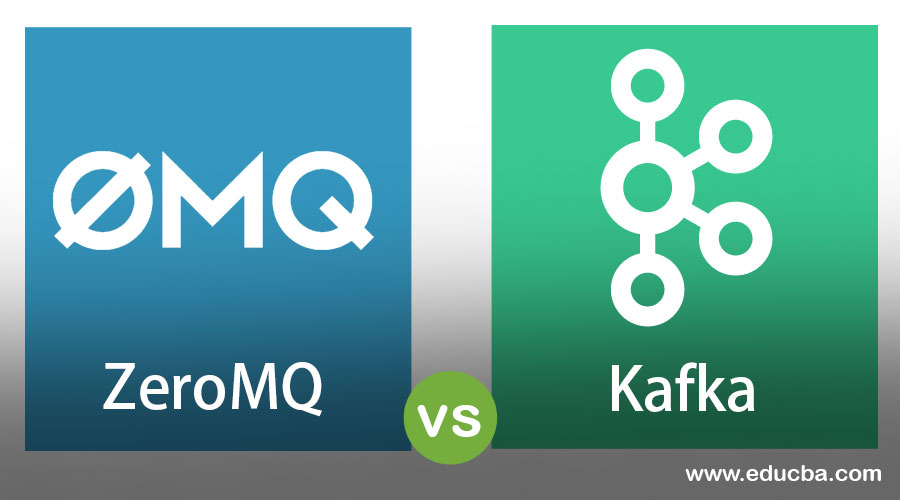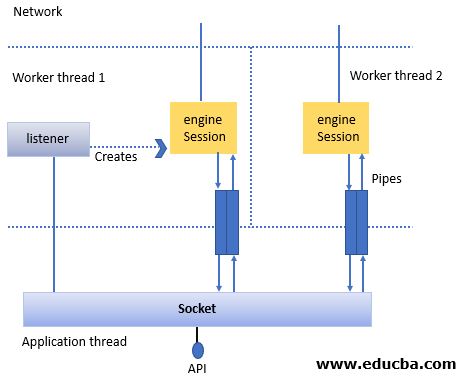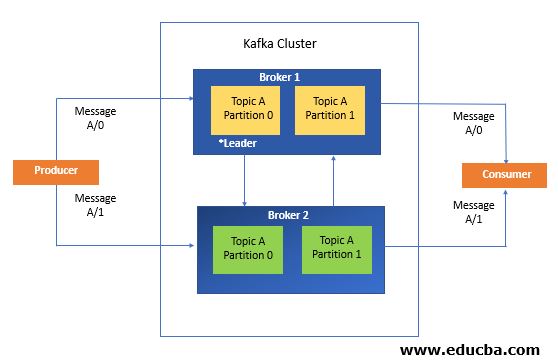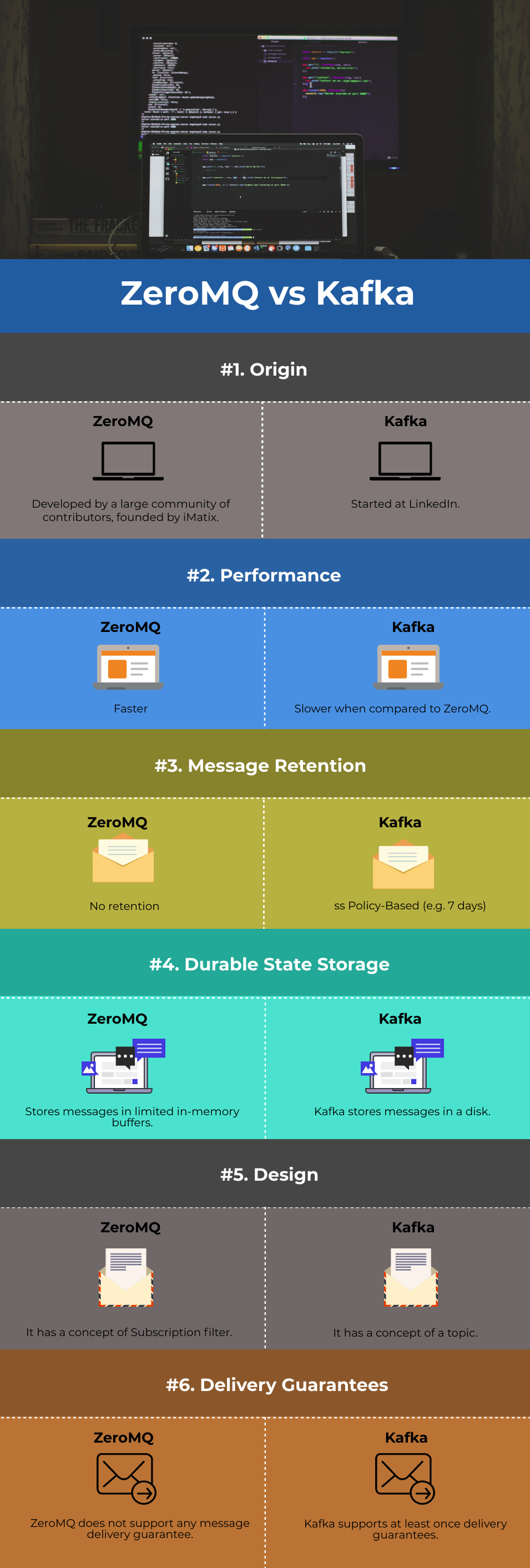Updated March 23, 2023

Difference Between ZeroMQ vs Kafka
ZeroMQ is an open-source, high-performance messaging library. It is cross-platform and supports cross languages and is light-weight and fast. ZeroMQ is a service provider of messaging. Using these providers, a messaging API is required to send and receive messages and need to integrate these providers with the application server. Apache Kafka is a messaging system that allows you to publish and subscribe to streams of messages that are based on topics and partition. In this way, it is similar to products such as ActiveMQ, RabbitMQ. But even with these similarities, Kafka has a range of fundamental differences from traditional messaging systems that make it different completely.
Architecture and Component
Here we will see the architecture and component of ZeroMQ vs Kafka which are given below:
ZeroMQ
It is an asynchronous messaging library that is used in different applications for messaging systems. It offers a message queue, but a ZeroMQ device will operate without a dedicated message broker, unlike other message-oriented.
- Sockets: Using sockets, the user interacts with These sockets are similar to TCP sockets, the difference between them is that each socket is able to handle multiple peer communication.
- Worker Thread: Various objects are residing in the worker Each of these objects is held by exactly one parent object (ownership is denoted by a simple full line in the diagram). Many objects are held by sockets directly; nevertheless, there are a few instances where an entity is controlled by a socket-owned object.

- Listener: A TCP listener entity listens to incoming TCP connections and generates an engine/session object for each new connection.
- Session: It is the session object that communicates with the ZeroMQ socket.
- Engine: The engine object communicates with the network.
- Pipe: While the sessions are exchanging messages with the sockets. There are two directions to pass messages Pipe object handles each direction of messages to be passed inside. Essentially, each pipe is a lock-free queue designed to quickly pass messages between threads.
Kafka
Kafka is a publish-subscribe messaging system. With streaming technologies such as Kafka, you can process new data as it is generated in your cluster, you might save it to HDFS, or you can save it to HBase or some other database, so you can process it in real-time as it comes in, you can do all that with streaming. There are few simple terminologies about Kafka that should be understood.

- Producers: Producer publishes message to one or more Kafka producer can serve as a data source in a Kafka cluster.
- Broker: Broker is a cluster made up of one or more servers in the broker who receives messages from the producer, assigns them to an offset and commits the message.
- Topics: Messages are divided into Topics are broken down into a number of partitions where they index and store messages that receive an incremental Id named offset.
- Consumers: Consumers subscribe to various topics and read data from brokers. They read data in consumer groups. The consumer always keeps track of which messages it has consumed by keeping track of the offset of messages.
Head to Head Comparison Between ZeroMQ vs Kafka (Infographics)
Below are the top 6 comparisons between ZeroMQ vs Kafka:

Key Differences Between ZeroMQ vs Kafka
Let us discuss some key differences between ZeroMQ vs Kafka in the following points:
1. Design
- ZeroMQ: ZeroMQ has a first-class definition of the subscription filter. Subscription filter helps you to decide which messages you are interested in receiving depending on the prefix match. The first frame of each message contains the logical name of the stream and the second frame contains the actual log record. Instead, we can configure ZeroMQ to render an exact match on the first frame so we only get the entries we care for.
- Kafka: Kafka has a first-class notion of a topic; it is a key concept that is used in messaging Topics that can be published and subscribed to, and are handled independently.
2. Delivery Guarantees
- ZeroMQ: It does not accept delivery guarantees If no subscribers are mentioned, ZeroMQ would drop messages and the configurable size buffers in memory may fill up.
- Kafka: Kafka supports the guarantee of message delivery at least once.
3. Durable State and Storage
- ZeroMQ: This stores messages in small buffers in memory.
- Kafka: Kafka stores messages on disk in order to support its delivery guarantees as well as the ability to retain messages that have already been consumed.
4. Performance
- ZeroMQ: ZeroMQ is much faster than Kafka because it doesn’t store messages on the disk so you don’t need to go back and forth to get messages. It stores messages in memory in small buffers.
- Kafka: In spite of the fact that Kafka is known to be fast compared to other message brokers like RabbitMQ, it is actually slower than ZeroMQ due to the need for disk for storing messages and back.
5. Message Retention
- ZeroMQ: It does not support message retention. If no subscribers are mentioned, ZeroMQ would drop messages and the configurable size buffers in memory may fill up even if the subscribers missed out.
- Kafka: Kafka supports message retention because Kafka is a log, there are always messages, you can monitor this by setting a retention policy for messages.
ZeroMQ vs Kafka Comparison Table
The table below summarizes the comparisons between ZeroMQ vs Kafka:
|
Comparison Points |
ZeroMQ |
Kafka |
|
Origin |
Developed by a large community of contributors, founded by iMatix. | Started at LinkedIn. |
|
Performance |
Faster | Slower when compared to ZeroMQ. |
|
Message Retention |
No retention | ss Policy-Based (e.g. 7 days) |
|
Durable State Storage |
Stores messages in limited in-memory buffers. | Kafka stores messages in a disk. |
|
Design |
It has a concept of Subscription filter. | It has a concept of a topic. |
|
Delivery Guarantees |
ZeroMQ does not support any message delivery guarantee. | Kafka supports at least once delivery guarantees. |
Conclusion
We’ve seen ZeroMQ vs Kafka in depth so far, we have come to the conclusion that ZeroMQ is not a message broker, but a library used to construct brokers and protocols. So, when compared with ZeroMQ, Kafka is a simpler and better-supported approach, you can use Kafka for massive data and high performance.
Recommended Articles
This is a guide to the top difference between ZeroMQ vs Kafka. Here we discuss the ZeroMQ vs Kafka key differences with infographics, and comparison table. You may also have a look at the following articles to learn more –


